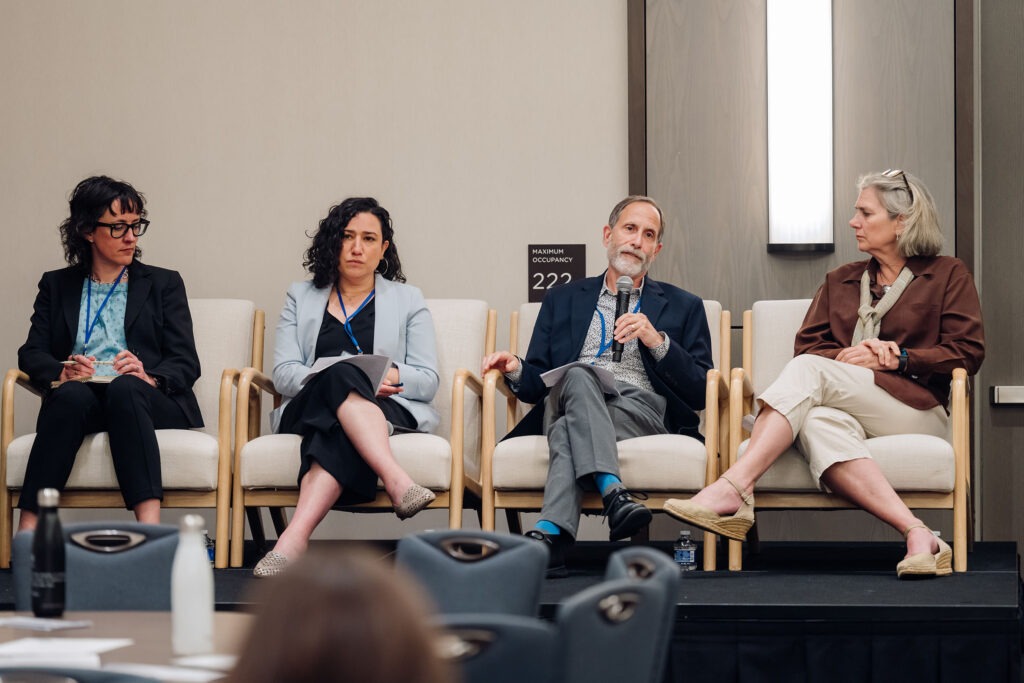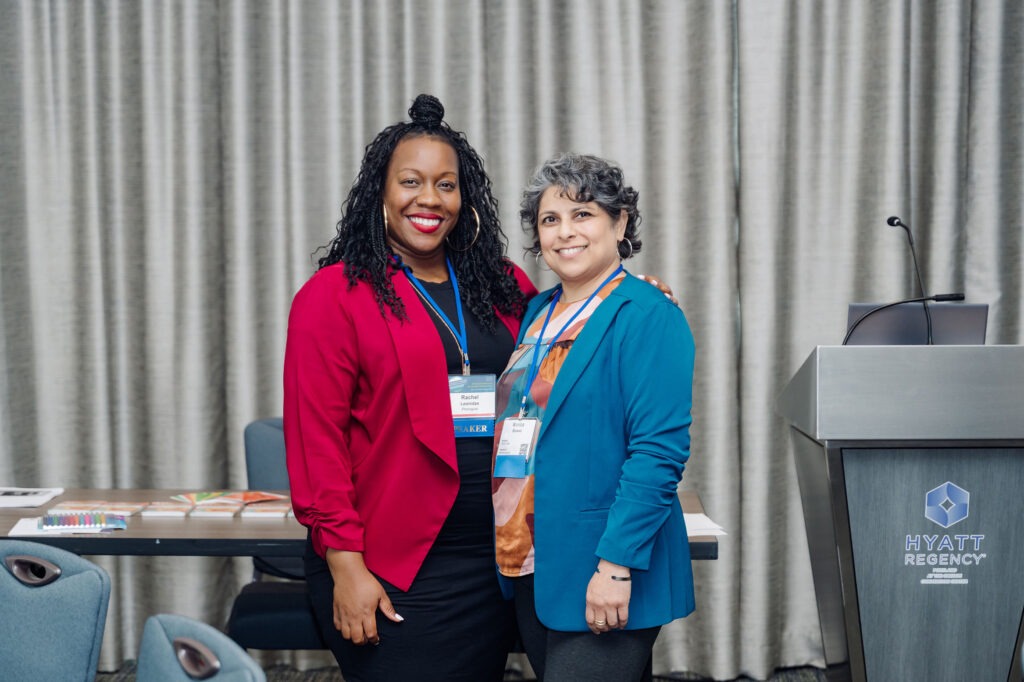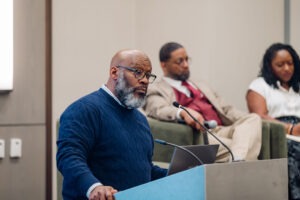Pre-conference sessions and connections kick off our week in Portland

The 2024 Grantmakers In Health Conference on Health Philanthropy, Bold Results Through Courageous Action, launched in Portland, Oregon today, Monday, June 3, 2024, with three engaging pre-conference sessions:
- Building a Community Violence Intervention Ecosystem
- Conditions for Thriving: Insights and Practices to Deepen Trust with Community
- Medicaid Unwound: What Comes Next?
Our conference is all about the collaborations that will spark your next bold ideas, actions, and results. Seeking more opportunities to learn, connect, and grow? The conference officially kicks off on Tuesday, June 4! Follow along for daily recaps, session spotlights, fun facts, and much more.
Session Spotlight: Medicaid Unwound: What Comes Next?
During the COVID-19 pandemic, Medicaid restrictions loosened to allow for recipients, including many low-income children and families, to have continuous enrollment in the program. But when the public health emergency came to an end, states began an elongated redetermination process, also known as “Medicaid unwinding.” So, where is Medicaid now? How can funders and states play defense and offense to ensure Medicaid’s success as we move into an unknown future? Today’s pre-conference session covered the current landscape of Medicaid through direct insights from the field, intimate breakout sessions, and discussions from an expert panel including:
- Patricia Boozang, Senior Managing Director, Manatt
- Heather Howard, Professor of the Practice and Director, State Health and Value Strategies, Princeton University School of Public and Internal Medicine
- Sue Birch, Director, Washington State Health Care Authority
- Avital Havusha, Vice President for Programs, New York Health Foundation
- Sheldon Weisgrau, Vice President, Health Policy and Advocacy, Missouri Foundation for Health.
The session launched with a detailed overview of the key areas impacting current Medicaid policy with particular attention to the challenges for states and the opportunities for funders:
- “Unwinding” the Medicaid Continuous Coverage Requirement and Long-Term Eligibility and Enrollment (E&E) Compliance
There were record levels of Medicaid enrollment during COVID-19, and now states have to take on the massive task of renewing eligibility. Many states are grappling with new staff or deficits of eligibility staff, which has amplified administrative errors. About 50 million people have lost coverage in this renewal process, even though a significant number are still eligible. - Expanding and Extending Health Coverage
The topline: Medicaid expansion and extension is enormously popular with all but 10 states having expanded Medicaid. From innovative strategies to leverage state and federal funds for immigrant populations to Continuous Enrollment (CE), states see the benefits of continuity and have doubled down on their efforts to expand and extend affordable, stable, and accessible health coverage for their residents. - Improving Access to Care
Centers for Medicare & Medicaid Services (CMS) recently issued a series of final rules to improve access to care, but there are significant implications for state Medicaid and CHIP programs. States need support to distribute resources, understand priorities, and deepen ways to organize themselves for implementation. There’s a larger burden on resources for states. - Addressing Health-Related Social Needs
CMS has provided clearer guidance on health-related social needs or adverse social conditions that contribute to poor health. While CMS has outlined options for housing and nutrition services that may be covered through Medicaid, state programs now have the challenge of strategic and efficient implementation. - Responding to New Challenges and Opportunities
States need support to respond to the unknown, especially as we head into the 2024 election. The federal and state policy environment is evolving, and states and funders need to be prepared for big shifts in 2025.
With the current Medicaid landscape set and a view into the future of policy, Stephanie Bell, Senior Policy Advisor at Centers for Medicare & Medicaid Services, highlighted unfolding themes from the federal policy perspective including Expanding Access, Strengthening Eligibility & Enrollment, and Enhancing Member Engagement. CMS has been working on rulemaking to build a stronger, more resilient, and consistent Medicaid program. However, she reinforced a lesson from the landscape analysis: States are in the process of digesting a large set of new information and figuring out how to best distribute resources.
With large amounts of research and big ideas on the table, the packed room broke into smaller groups to discuss the following questions:
- What approaches have you or your organization found most successful for engaging in this work and advancing your Medicaid-related goals?
- How has your state/community influenced your approach?
- What challenges have you faced in your efforts?
After these more intimate and wide-ranging discussions, the full panel of policy experts and funders came back together to discuss partnerships and opportunities to support Medicaid. While all noted that there have been some logistical and administrative issues with implementing Medicaid, there have also been novel funding approaches to help bridge the gaps between community-based organizations and the state. Philanthropy can play the role of convener by bringing perspectives from beneficiaries and legislators to the table. All panelists emphasized that collaborations are essential. Funders cannot afford to wait to build relationships, especially as we inch closer to November 2024.
They recognized that some foundations are still reluctant to work on policy and advocacy, and this is where bold leadership matters. With current leaders on the way out, foundations can help establish the next set of emerging voices. Medicaid is complex, and while leaders may never know all the intricacies, they can be bold in their approach to advocacy by feeling more confident in the research and having a community to support new thought leadership.
To close the session, panelists identified the biggest opportunities for philanthropy today:
- Build and nurture relationships.
- Identify gaps and help bridge perspectives and sectors.
- Don’t underestimate the power of advocacy.
- Strengthen the Medicaid program to better serve the people.
- Be a convener.
- Share models.
- Be prepared for leadership turnover.
- Know that continued research matters—don’t hesitate to throw more information onto the pile.
- Create space for leadership development to prepare the next generation for bold advocacy.
What’s next is now. Coverage innovations will continue to happen. Philanthropy can be ready with research, collaborations, and courageous advocacy and action.
This pre-conference session, Medicaid Unwound: What Comes Next?, was supported by the W.K. Kellogg Foundation.
On the Ground
“Zoom is great, but there is no substitute for meeting people in person. I love to learn about what my colleagues are doing. Building relationships with peers is key to our work. The GIH Annual Conference plays a pivotal role in building those connections, grounding us in our work, and fueling our next steps at the foundation. Today I attended Medicaid Unwound: What Comes Next? because Medicaid is a big part of the health improvement efforts in our state. I left with the most current information about the Medicaid landscape, and new learnings direct from technical experts and peer foundations.”
—Brandon Skidmore, President and CEO, Sunflower Foundation

Fun fact: Have you stopped to smell the roses today? With a climate particularly hospitable to roses, Portland aka the City of Roses, has the oldest continuously operated public rose test garden in the United States.
Follow all the conference activities on GIH socials and the official GIH Annual Conference app.
Facebook | LinkedIn | Instagram | Conference App

